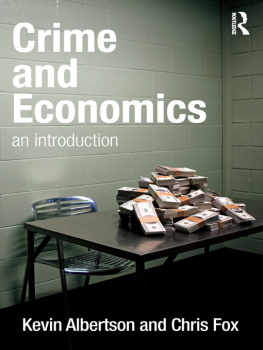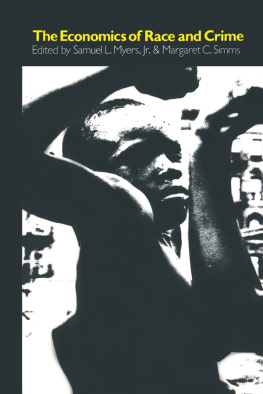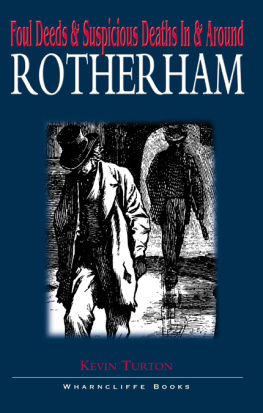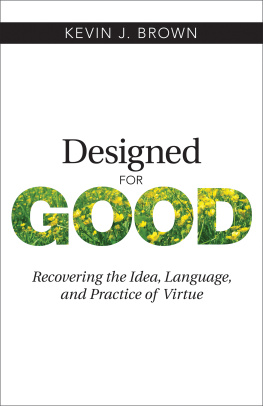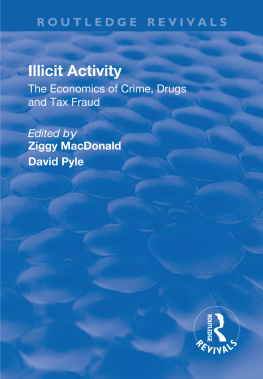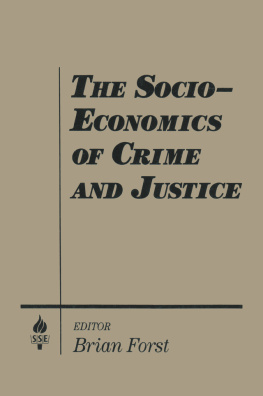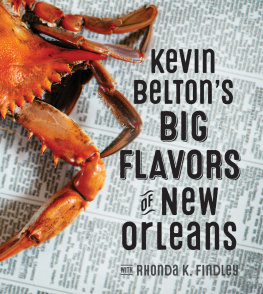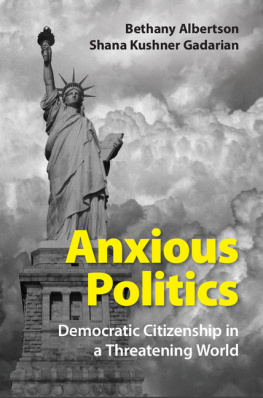Crime and Economics
Crime and Economics provides the first comprehensive and accessible text to address the economics of crime within the study of crime and criminology.
The economics of crime is an area of growing activity and concern, increasingly influential both to the study of crime and criminal justice and to the formulation of crime reduction and criminal justice policy. As well as providing an overview of the relationship between economics and crime, this book poses key questions such as: What is the impact of the labour market and poverty on crime? Can society decrease criminal activity from a basis of economic disincentives? What forms of crime reduction and methods of reducing re-offending are most cost beneficial? Can illicit organised crime and illicit drug markets be understood better through the application of economic analysis?
For those interested in economic methods, but without previous economic training, this book also provides an accessible overview of key areas such as cost benefit analysis, econometrics and the debate around how to estimate the costs of crime.
This book will be key reading for undergraduate and postgraduate students of criminology and economics and those working in the criminal justice system including practitioners, managers and policy-makers.
Kevin Albertson is Acting Head of the Department of Economics at Manchester Metropolitan University.
Chris Fox is Professor of Evaluation in the Department of Sociology at Manchester Metropolitan University.
Crime and Economics
An introduction
Kevin Albertson and Chris Fox
First published 2012
by Routledge
2 Park Square, Milton Park, Abingdon, Oxon, OX14 4RN
Simultaneously published in the USA and Canada
by Routledge
711 Third Avenue, New York, NY 10017
Routledge is an imprint of the Taylor & Francis Group, an informa business
2012 Kevin Albertson and Chris Fox
The right of Kevin Albertson and Chris Fox to be identified as authors of this work has been asserted by them in accordance with sections 77 and 78 of the Copyright, Designs and Patents Act 1988.
All rights reserved. No part of this book may be reprinted or reproduced or utilised in any form or by any electronic, mechanical, or other means, now known or hereafter invented, including photocopying and recording, or in any information storage or retrieval system, without permission in writing from the publishers.
Trademark notice: Product or corporate names may be trademarks or registered trademarks, and are used only for identification and explanation without intent to infringe.
British Library Cataloguing in Publication Data
A catalogue record for this book is available from the British Library
Library of Congress Cataloging in Publication Data
Albertson, Kevin, 1963
Crime and economics : an introduction / Kevin Albertson and
Chris Fox. 1st ed.
p. cm.
1. CrimeEconomic aspects. I. Fox, Chris, 1973 II. Title.
HV6030.A43 2011
364.01dc22
2011003447
ISBN: 9781843928430 (hbk)
ISBN: 9781843928423 (pbk)
ISBN: 9780203813041 (ebk)
Kevin would like to thank his valued
colleagues in the Department of Economics at
Manchester Metropolitan University for their
support and encouragement and for bearing
with him while he ran ideas past them over
endless cups of coffee.
Chris would like to thank everyone at
Manchester Metropolitan University with
whom he has worked over the last three years.
He dedicates this book to Emma, with love.
Figures
| 2.1 |
| 2.2 |
| 2.3 |
| 2.4 |
| 2.5 |
| 2.6 |
| 2.7 |
| 2.8 |
| 2.9 |
| 2.10 |
| 3.1 |
| 3.2 |
| 3.3 |
| 3.4 |
| 3.5 |
| 3.6 |
| 3.7 |
| 3.8 |
| 3.9 |
| 5.1 |
| 5.2 |
| 6.1 |
| 6.2 |
| 6.3 |
| 6.4 |
| 6.5 |
| 6.6 |
| 6.7 |
| 6.8 |
| 6.9 |
| 6.10 |
| 6.11 |
| 6.12 |
| 6.13 |
| 6.14 |
| 7.1 |
| 8.1 |
| 8.2 |
| 8.3 |
| 9.1 |
| 11.1 |
| 11.2 |
| 11.3 |
| 11.4 |
| 11.5 |
| 11.6 |
| 11.7 |
Tables
| 6.1 |
| 7.1 |
| 8.1 |
| 10.1 |
| 10.2 |
| 11.1 |
| 11.2 |
| 11.3 |
1 Introduction
Why crime and economics?
Why do we need a book on crime and economics? At first glance the reader might wonder what economics can bring to the study of crime. As Levitt and Miles point out:
The casual observer might expect that economics has little to contribute to the understanding of criminal activity. Economics is a discipline seemingly concerned with market-based transactions in which parties act purposefully to realize the benefits of exchange. In contrast, many criminal acts, such as homicide and theft, are inherently nonconsensual, even coercive. Moreover, many crimes appear to be acts of impulse or emotion rather than the kind of rational decision making associated with market behavior.
(Levitt and Miles 2006: 147)
However, as Levitt and Miles go on to show, this is to take too narrow a view of economics and what it has to offer. Over recent years, the reach of economics has grown. In their best-selling book, Freakonomics , Levitt and Dubner (2005: 14) write economics is the hidden side of everything. As an applied social science, the tools economists wield have been applied to subjects ranging from: obesity (Chou et al. 2004); to sport (Morley and Thomas 2005, for example); and climate change (for example, Nordhaus 2007; Stern 2007); to name but a few.
Over recent years economists have played an increasing role in research and policy on crime, crime reduction and criminal justice. This has taken many forms. Following Gary Beckers landmark 1968 article, economic debate on crime in the 1970s concentrated in particular on developing economic theories of criminal behaviour and the effect of criminal justice sanctions. The improvement of data available through the criminal justice system has allowed economists to use their favoured forms of analysis in this field. Economists have undertaken costbenefit analyses of crime reduction and criminal justice interventions, estimated the costs of different types of crime and contributed to the development of criminal justice policy. And anyway, its fun, isnt it? What we wonder is: why isnt economics more prominent in criminology courses and why are economists not more prominent in the development of criminal justice policy?
Why isnt economics more prominent in the study of crime?


